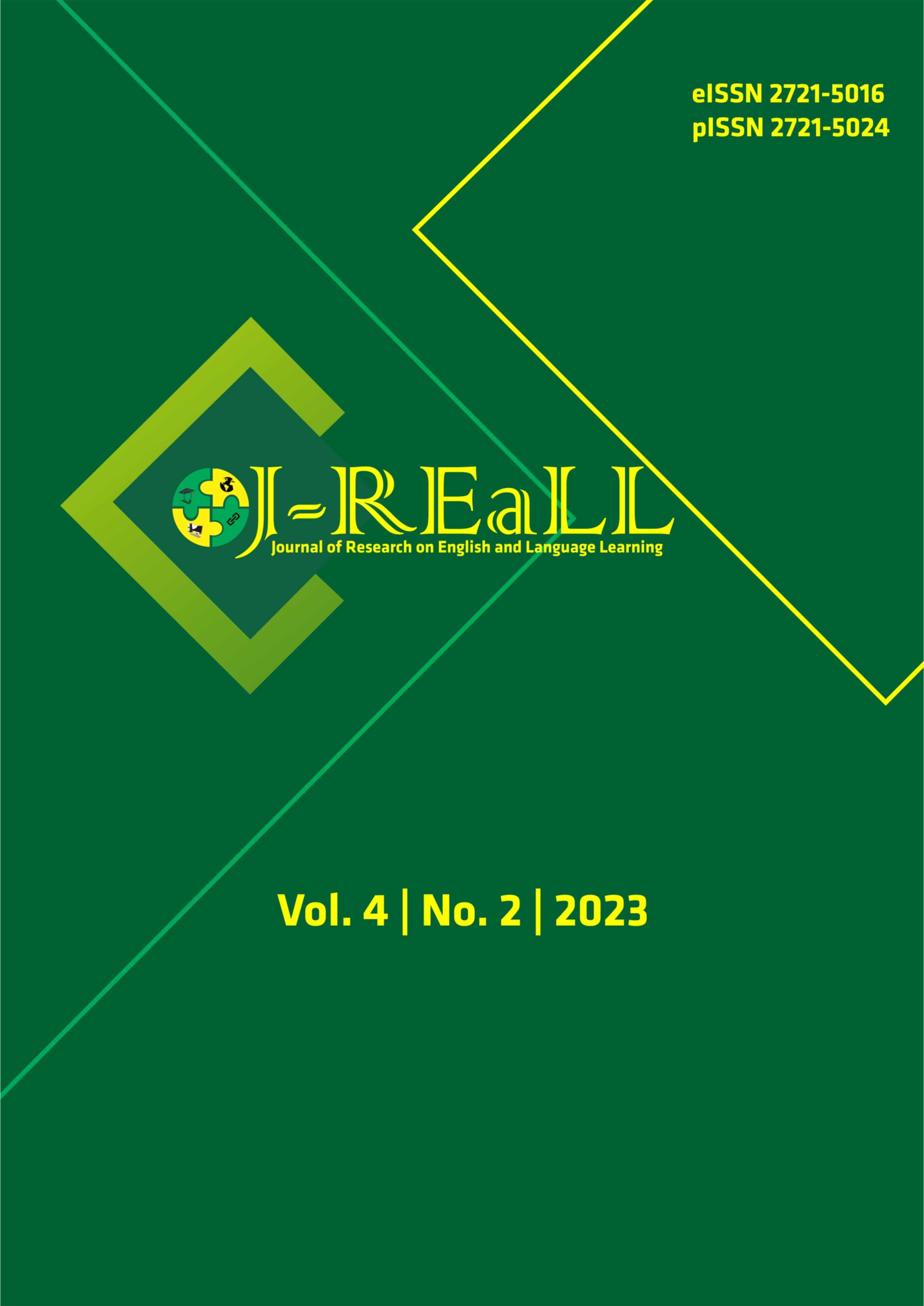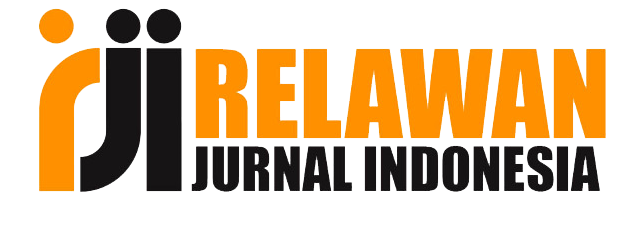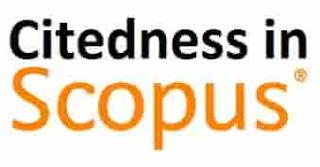Students’ and lecturers’ perceptions towards e-learning in higher education
DOI:
https://doi.org/10.33474/j-reall.v4i2.20145Keywords:
e-learning, higher education, perceptionsAbstract
This research determines the perceptions of students and lecturers on using e-learning at a private university in Batam. A mixed methods approach was employed to find out these perceptions. Researchers further collected the data through open and closed questionnaires from 243 students (2019-2022 school year) and 19 lecturers who were actively teaching and using e-learning. After obtaining the data, the questionnaire results were calculated using SPSS software version 25 and transcribed qualitatively. The results show that students and lecturers had positive perceptions towards e-learning. This is measured by the knowledge, adaptation, benefits, and attitudes of students and lecturers in using e-learning. However, several obstacles were faced by them, such as time management, difficulties in accessing the e-learning website, the user interface (UI) display is quite complicated, unsupported internet signal, and others. It can be concluded that both lecturers and students have good ability in using e-learning at higher education levels.
References
Al-Balas, M., Al-Balas, H. I., Jaber, H. M., Obeidat, K., Al-Balas, H., Aborajooh, E. A., Al-Taher, R., & Al-Balas, B. (2020). Distance learning in clinical medical education amid covid-19 pandemic in Jordan: current situation, challenges, and perspectives. BMC Medical Education, 20(1), 1–7. https://doi.org/10.1186/s12909-020-02257-4
Alviolita, A. M. (2015). Pembuatan User Manual On-Screen untuk E-Learning pada SMPN 1 Jember Berdasarkan IEEE STD 26514-2010 [Institut Teknologi Sepuluh Nopember]. https://repository.its.ac.id/71622/1/5211100071-Undergraduate Thesis.pdf
Amalia, N. F., & Pujiastuti, E. (2017). Kemampuan berpikir kritis dan rasa ingin tahu melalui model PBL. PRISMA, Prosiding Seminar Nasional Matematika, 523–531.
Amri, C. O., Jaelani, A. K., & Saputra, H. H. (2021). Peningkatan literasi digital peserta didik: Studi pembelajaran menggunakan e-learning. Jurnal Ilmiah Profesi Pendidikan, 6(3), 546–551. https://doi.org/10.29303/jipp.v6i3.291
Anggraini. (2018). Keefektifan pembelajaran elektronik (E-learning) sebagai pengganti perkuliahan konvensional untuk keefektivan meningkatkan kemampuan analitis mahasiswa. Jurnal Sosial Humaniora, 9(2), 95–105. https://doi.org/10.30997/jsh.v9i2.1101
Anggun, P. (2021). Analisis Kesulitan Belajar Siswa dalam Pembelajaran Tematik pada Siswa Kelas V SDN 5 Merak Batin Natar Lampung Selatan [Raden Intan Lampung]. http://repository.radenintan.ac.id/13224/
Arkorful, V., & Abaidoo, N. (2015). The role of e-learning, advantages and disadvantages of its adoption in higher education. International Journal of Instructional Technology and Distance Learning, 12(1), 29–42.
Basar, Z. M., Mansor, A. N., Jamaludin, K. A., & Alias, B. S. (2021). The effectiveness and challenges of online learning for secondary school students - A case study. Asian Journal of University Education, 17(3), 119–129. https://doi.org/10.24191/ajue.v17i3.14514
Bhuana, G. P., & Apriliyanti, D. L. (2021). Teachers’ encounter of online learning: Challenges and support system. Journal of English Education and Teaching, 5(1), 110–122.
Chitra, A. P., & Raj, M. A. (2018). E-Learning. India Journal of Applied and Advanced Research, 2018(3), 11–13. https://doi.org/10.21839/jaar.2018.v3S1.158
Fakhri, M. M., Fadhilatunisa, D., Rosidah, R., Satnur, M. A., & Fajrin, F. (2022). Pengaruh media e-learning berbasis LMS moodle dan motivasi belajar terhadap hasil belajar mahasiswa di masa pandemi covid-19. Chemistry Education Review (CER), 5(2), 157–169. https://doi.org/10.26858/cer.v5i2.32724
Febrianti, S., Nursafwa, H., Arifin, B., Hayati, I., & Zailani, Z. (2021). Analisis faktor-faktor yang mempengaruhi minat belajar mahasiswa di masa pandemi pada mata kuliah penulisan karya ilmiah di Universitas Muhammadiyah Sumatera Utara. Al-Ulum: Jurnal Pendidikan Islam, 2(1), 48–57.
Ferdiansyah, F., Ambiyar, A., Zagoto, M. M., & Putra, I. E. D. (2020). Pemanfaatan media pembelajaran berbasis e learning dalam meningkatkan hasil belajar pada matakuliah media pembelajaran musik. Komposisi: Jurnal Pendidikan Bahasa, Sastra, Dan Seni, 21(1), 62–72. https://doi.org/10.24036/komposisi.v21i1.108082
Gempiara, G., & Supendi, M. (2021). Efektivitas program bantuan kuota belajar di Universitas Muhammadiyah Prof. Hamka. Dinamika Governance: Jurnal Ilmu Administrasi Negara, 11(2), 256–273. https://doi.org/10.33005/jdg.v11i2.2784
Goyal, S. (2012). E-Learning: Future of education. Journal of Education and Learning (EduLearn), 6(4), 239. https://doi.org/10.11591/edulearn.v6i4.168
Hafeez, M., Kazmi, Q. A., & Tahira, F. (2022). Challenges faced by the teachers and students in online learning during covid-19. Cakrawala Pendidikan, 41(1), 55–70. https://doi.org/10.21831/cp.v41i1.35411
Hatip, A., Sucipto, S., & Setiawan, W. (2019). Pelatihan penggunaan e-learning berbasis media sosial edmodo bagi guru SD negeri Mulyorejo I Surabaya. Jurnal Pengabdian Dan Penerapan IPTEK (JPP IPTEK), 3(1), 61–68. https://doi.org/10.31284/j.jpp-iptek.2019.v3i1.428
Ja’ashan, M. M. N. H. (2020). The challenges and prospects of using E-learning among EFL students in Bisha university. Arab World English Journal, 11(1), 124–137. https://doi.org/10.24093/awej/vol11no1.11
Lugianti, D., Indramawan Nugroho, B., & Surorejo, S. (2022). Penerapan sistem interaksi manusia dan komputer pada website e-learning di STMIK Tegal. Jurnal Minfo Polgan, 11(2), 36–44. https://doi.org/10.33395/jmp.v11i2.11639
Lutfiyah, I. (2022). Evaluasi Pembelajaran Bahasa Inggris di Era Pandemi Covid-19 di SMP Muhammadiyah Kota Malang [Universitas Muhammadiyah Malang]. https://eprints.umm.ac.id/87790/1/naskah.pdf
Mardiah, H. (2020). The use of e-learning to teach English in the time of the covid-19 pandemic. English Teaching and Linguistics Journal (ETLiJ), 1(2), 49–55. https://doi.org/10.30596/etlij.v1i2.4894
Marsevani, M. (2022). The challenges of e-learning for higher education lecturers and learners. Journal of Education Technology, 6(3), 467–477. https://doi.org/10.23887/jet.v6i3.45537
Muzamilah, S., Suriyah, P., Education, A., & Education, A. (2020). Teachers’ challenges in implementing E-Learning to teach EFL writing. Jurnal Pendidikan Edutama, 1–10.
Rawashdeh, A. Z. Al, Mohammed, E. Y., Arab, A. R. Al, Alara, M., & Al-Rawashdeh, B. (2021). Advantages and disadvantages of using E-learning in university education: Analyzing students’ perspectives. Electronic Journal of E-Learning, 19(2), 107–117. https://doi.org/10.34190/ejel.19.3.2168
Rosalina, E., Nasrullah, N., & Elyani, E. P. (2020). Teacher’s challenges towards online learning in pandemic era. LET: Linguistics, Literature and English Teaching Journal, 10(2), 71. https://doi.org/10.18592/let.v10i2.4118
Sabar. (2011). Penggunaan web (e-learning) dalam proses pembelajaran bahasa inggris di Briton International English School Makassar. Jurnal Komunikasi KAREBA, 1(4), 444–456. https://doi.org/10.31947/kjik.v1i4.324
Selfi, G., & Akmal, A. (2021). Pelaksanaan pembelajaran berbasis e-learning masa covid-19 pada mahasiswa tahun masuk 2020 PPKn UNP. Journal of Civic Education, 4(3), 212–218. https://doi.org/10.24036/jce.v4i3.543
Setiaji, B., & Dinata, P. A. C. (2020). Analisis kesiapan mahasiswa jurusan pendidikan fisika menggunakan e-learning dalam situasi pandemi covid-19. Jurnal Inovasi Pendidikan IPA, 6(1), 59–70. https://doi.org/10.21831/jipi.v6i1.31562
Tavangarian, D., Leypold, M. E., Nölting, K., Röser, M., & Voigt, D. (2004). Is e-learning the solution for individual learning? Electronic Journal of E-Learning, 2(2), 273–280. http://citeseerx.ist.psu.edu/viewdoc/download?doi=10.1.1.116.8017&rep=rep1&type=pdf
Vitoria, L., Mislinawati, M., & Nurmasyitah, N. (2018). Students’ perceptions on the implementation of e-learning: Helpful or unhelpful? Journal of Physics: Conference Series, 1–6. https://doi.org/10.1088/1742-6596/1088/1/012058
Vovides, Y., Sanchez-Alonso, S., Mitropoulou, V., & Nickmans, G. (2007). The use of e-learning course management systems to support learning strategies and to improve self-regulated learning. Educational Research Review, 2(1), 64–74. https://doi.org/10.1016/j.edurev.2007.02.004
Wijaya, R., Lukman, M., & Yadewani, D. (2020). Dampak pandemi covid19 terhadap pemanfaatan e learning. Jurnal Dimensi, 9(2), 307–322. https://doi.org/10.33373/dms.v9i2.2543
Zalat, M. M., Hamed, M. S., & Bolbol, S. A. (2021). The experiences, challenges, and acceptance of e-learning as a tool for teaching during the covid-19 pandemic among university medical staff. Plos One, 16(3), 1–12. https://doi.org/10.1371/journal.pone.0248758
Downloads
Published
How to Cite
Issue
Section
License
Copyright (c) 2023 Maya Marsevani, Rika Al Fitri

This work is licensed under a Creative Commons Attribution 4.0 International License.
Authors who publish this journal agree to the following terms:
- Authors retain copyright and grant the journal right of first publication with the work simultaneously licensed under a Creative Commons Attribution License that allows others to share the work with an acknowledgement of the work's authorship and initial publication in this journal.
- Authors can separately make additional contractual arrangements for non-exclusive distribution published by the journal (e.g., publish it in a book), with an acknowledgement of its initial publication in this journal.
- Authors are allowed and encouraged to send their work via online (e.g., in the institutional repositories or their website) after published by the journal.





















